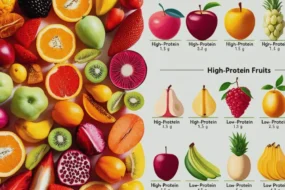
Understanding nutrition and dietary intake is crucial for a healthy experience during pregnancy. Yet, it can be hard to separate fact from fiction. Protein, a vital macronutrient, is essential in fetal development and maternal health.
While many rely on food sources for important nutrients, some may use protein powders and other supplements to support their growing baby. With increasing popularity, these products offer a way to ensure enough intake.
However, knowing how much protein is safe and the potential benefits of dietary supplements can help parents make informed choices for positive pregnancy outcomes.
Is Protein Powder Safe During Pregnancy
Yes, protein powder can be safe during pregnancy when used under medical guidance. It can help meet nutritional needs but should supplement a balanced diet, not replace whole foods.
The Importance of Protein During Pregnancy
Protein is essential during pregnancy, playing a significant role in the growth and development of fetal tissues—including the brain—and maternal tissues such as the uterus and breasts. An adequate protein intake is also vital for producing hormones, enzymes, and antibodies that support a healthy pregnancy.
The Australian National Health and Medical Research Council (NHMRC) recommends increased protein during pregnancy to help with these physiological changes. The recommended dietary intake (RDI) suggests about 1 gram of protein per kilogram of body weight per Day for people in their second and third trimesters, with an additional 14 grams of protein needed per Day compared to non-pregnant women.
For instance, if someone weighs 60kg, their daily requirement would be 60g. Some studies even indicate a higher requirement—ranging from 1.2g/kg in the early stages (around ~16 weeks) to 1.52g/kg in the later stages (~36 weeks)—to meet the baby’s changing needs and rapid growth. Consulting a healthcare professional, such as a dietitian, can help ensure you get the correct amount of protein during this time.
How Much Protein do You Need During Pregnancy?
During pregnancy, it’s essential to aim for 70 to 100 grams of protein daily to support your total body weight and meet the needs of your growing baby. A hard-boiled egg weighs about 6 grams, and a skinless chicken breast provides 26 grams.
If you’re not a fan of eating meat or dairy, don’t worry—plenty of plant foods are also rich in protein. For instance, half a cup of lentils offers about 9 grams, and cottage cheese contains 28 grams per serving. You can also include:
- A handful of nuts.
- A bowl of soup with 15 grams.
- A glass of milk provides 8 grams.
Another excellent source for pregnancy is Chana Dal, known for the Health Benefits of Chana Dal, which include high protein content and digestive support. If you’re struggling to get enough protein, consider adding a protein powder supplement or meal replacement to help boost your intake. Just remember to consult your OB for approval to make sure it’s safe.
Types of Protein Powders
When considering protein powders during pregnancy, there are several types to choose from, each with unique benefits and potential considerations. Here are some popular options:
- Whey Protein:
A complete protein derived from milk, containing all essential amino acids.It is known for being quickly absorbed and commonly used due to its effectiveness.
- Casein Protein:
It is also derived from milk but is digested slowly. It provides a steady release of amino acids over time, offering a longer-lasting effect for fullness.
- Plant-Based Proteins:
It is ideal for vegetarians, vegans, or those with dairy intolerances. Options include pea, soy protein, and brown rice. Each offers a range of amino acids, making them viable choices to support protein intake during pregnancy.
Each type of protein powder can help fulfill different nutritional needs during pregnancy. By understanding these options, you can choose which benefits suit your dietary goals and lifestyle.
Benefits of Protein Powder During Pregnancy
For pregnant individuals, protein powders can offer a quick and easy way to boost protein intake, especially when feeling busy or nauseous. Preparing and consuming whole foods isn’t always feasible.
In these cases, protein powders come in handy to provide essential nutrients. Some protein powders are fortified with additional beneficial vitamins and minerals during pregnancy, including calcium, iron, and folic acid—critical nutrients for supporting mother and baby.
Using high-quality protein powders, like casein and isolate blends, can be helpful and is often easy to digest, making them a good option for those struggling with morning sickness or food aversions.
However, it’s wise to be cautious and avoid “double-dipping” on nutrients if you’re already taking a prenatal vitamin, as this could lead to excess levels and potential toxicity risks.
Are There Risks with Protein Powders During Pregnancy?
When pregnant people use protein powders as a primary source of protein, there are some risks to keep in mind. Accidentally ingesting too much protein from pure protein powder could counteract health benefits and even be harmful.
Some extreme diet trends suggest high-protein, low-carbohydrate intake diets, which are not recommended for most people during pregnancy, as carbs and fats are crucial for brain function and other bodily processes.
It’s essential to ensure a balanced, nutritious diet for all food groups rather than accidentally forgetting carbohydrates and fats. Adding protein smoothies with fruits, vegetables, and healthy fats can help maintain a mindful approach that supports overall health outside of just protein.
FAQ’s
Q: Which Month to Take Protein Powder in Pregnancy?
Getting enough protein is important throughout pregnancy, especially in the second and third trimesters, when the baby and your body are growing the fastest. Protein is critical during this time to accommodate these changes and support healthy development.
Q: Is B Protein Powder Safe During Pregnancy?
Yes, pregnant women can also consume B Protin Powder. Still, doing so under medical supervision is essential to ensure it fits their specific needs during pregnancy.
Conclusion
Protein is vital for supporting the health and development of both mother and baby during pregnancy, particularly as the body’s needs grow in the later trimesters. While food sources remain the best option for meeting nutritional needs, protein powders can be a helpful supplement when managed thoughtfully.
However, it’s essential to use these supplements under the guidance of a healthcare provider to ensure safety and effectiveness, especially if already taking other prenatal vitamins. Parents can make informed choices that support a healthy and positive pregnancy journey by aiming for a balanced diet and using supplements carefully.
I’m Ayesha Zahid, a certified Nutritionist and Dietitian with over 3 years of hands-on experience helping individuals and families improve their health through nutrition.



